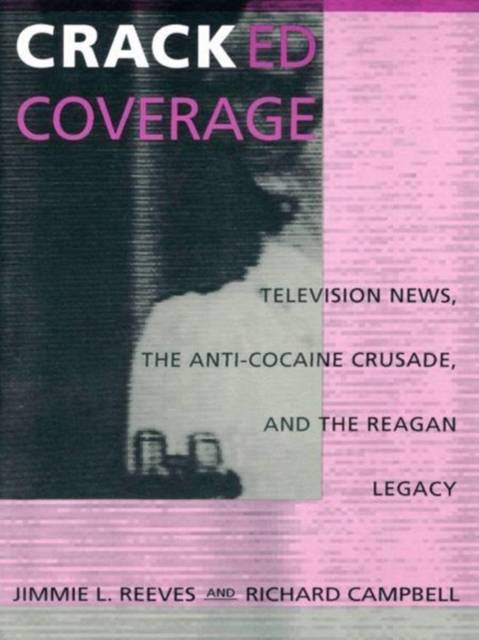
Nos liseuses Vivlio rencontrent actuellement des problèmes de synchronisation. Nous faisons tout notre possible pour résoudre ce problème le plus rapidement possible. Toutes nos excuses pour la gêne occasionnée !
- Retrait gratuit dans votre magasin Club
- 7.000.000 titres dans notre catalogue
- Payer en toute sécurité
- Toujours un magasin près de chez vous
Nos liseuses Vivlio rencontrent actuellement des problèmes de synchronisation. Nous faisons tout notre possible pour résoudre ce problème le plus rapidement possible. Toutes nos excuses pour la gêne occasionnée !
- Retrait gratuit dans votre magasin Club
- 7.000.0000 titres dans notre catalogue
- Payer en toute sécurité
- Toujours un magasin près de chez vous
Cracked Coverage
Television News, the Anti-Cocaine Crusade, and the Reagan Legacy
Jimmie L Reeves, Richard Campbell
Livre relié | Anglais
124,45 €
+ 248 points
Format
Description
Carefully documenting the deceptions and excesses of television news coverage of the so-called cocaine epidemic, Cracked Coverage stands as a bold indictment of the backlash politics of the Reagan coalition and its implicit racism, the mercenary outlook of the drug control establishment, and the enterprising reporting of crusading journalism. Blending theoretical and empirical analyses, Jimmie L. Reeves and Richard Campbell explore how TV news not only interprets "reality" in ways that reflect prevailing ideologies, but is in many respects responsible for constructing that reality. Their examination of the complexity of television and its role in American social, cultural, and political conflict is focused specifically on the ways in which American television during the Reagan years helped stage and legitimate the "war on drugs," one of the great moral panics of the postwar era.
The authors persuasively argue, for example, that powder cocaine in the early Reagan years was understood and treated very differently on television and by the state than was crack cocaine, which was discovered by the news media in late 1985. In their critical analysis of 270 news stories broadcast between 1981 and 1988, Reeves and Campbell demonstrate a disturbing disparity between the earlier presentation of the middle- and upper-class "white" drug offender, for whom therapeutic recovery was an available option, and the subsequent news treatment of the inner-city "black" drug delinquent, often described as beyond rehabilitation and subject only to intensified strategies of law and order. Enlivened by provocative discussions of Nancy Reagan's antidrug activism, the dramatic death of basketball star Len Bias, and the myth of the crack baby, the book argues that Reagan's war on drugs was at heart a political spectacle that advanced the reactionary agenda of the New and Religious Right--an agenda that dismissed social problems grounded in economic devastation as individual moral problems that could simply be remedied by just saying "no."
Wide ranging and authoritative, Cracked Coverage: Television News, the Anti-Cocaine Crusade, and the Reagan Legacy is a truly interdisciplinary work that will attract readers across the humanities and social sciences in addition to students, scholars, journalists, and policy makers interested in the media and drug-related issues.
The authors persuasively argue, for example, that powder cocaine in the early Reagan years was understood and treated very differently on television and by the state than was crack cocaine, which was discovered by the news media in late 1985. In their critical analysis of 270 news stories broadcast between 1981 and 1988, Reeves and Campbell demonstrate a disturbing disparity between the earlier presentation of the middle- and upper-class "white" drug offender, for whom therapeutic recovery was an available option, and the subsequent news treatment of the inner-city "black" drug delinquent, often described as beyond rehabilitation and subject only to intensified strategies of law and order. Enlivened by provocative discussions of Nancy Reagan's antidrug activism, the dramatic death of basketball star Len Bias, and the myth of the crack baby, the book argues that Reagan's war on drugs was at heart a political spectacle that advanced the reactionary agenda of the New and Religious Right--an agenda that dismissed social problems grounded in economic devastation as individual moral problems that could simply be remedied by just saying "no."
Wide ranging and authoritative, Cracked Coverage: Television News, the Anti-Cocaine Crusade, and the Reagan Legacy is a truly interdisciplinary work that will attract readers across the humanities and social sciences in addition to students, scholars, journalists, and policy makers interested in the media and drug-related issues.
Spécifications
Parties prenantes
- Auteur(s) :
- Editeur:
Contenu
- Nombre de pages :
- 344
- Langue:
- Anglais
Caractéristiques
- EAN:
- 9780822314493
- Date de parution :
- 29-04-94
- Format:
- Livre relié
- Format numérique:
- Genaaid
- Poids :
- 725 g







